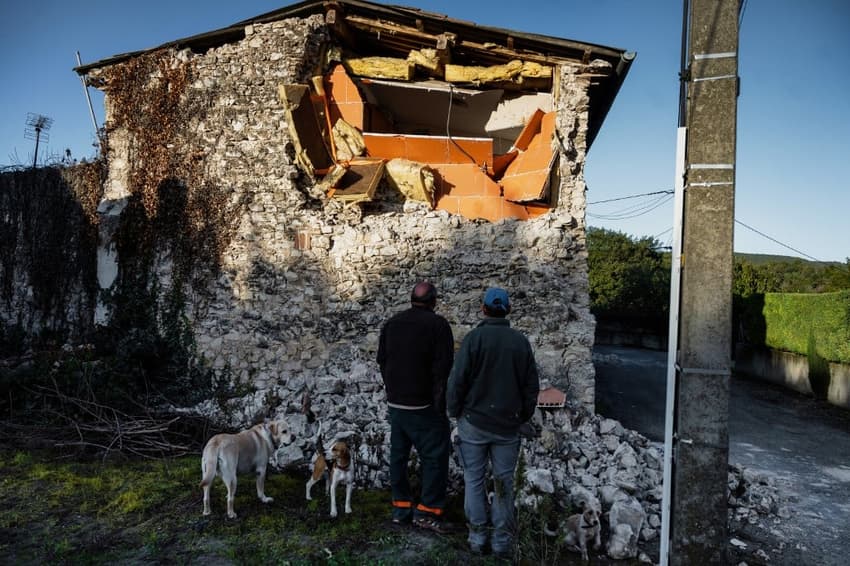Where you are most likely to get hit by an earthquake in France

After four people were injured when an unusually powerful earthquake shook the south east on Monday, The Local takes a look at where in France you are most likely to feel the earth move beneath your feet.
Monday’s quake, with a magnitude of 5.4, was felt in a vast area between the cities of Lyon and Montelimar which are about 150 kilometres apart, the national seismological office said.
But that area is not the French region the most at risk from earthquakes.
That honour falls to two regions in the French Alps and a zone that runs almost the entire length of the Pyrenees beween France from Spain.
Le Parisien newspaper has produced a handy guide to where the most recent quakes have taken place and where the riskiest zones are.
Un tremblement de terre près de Montélimar ressenti jusqu’à Lyon >> https://t.co/QUU1RUd3Qi #seisme #montelimar #TremblementDeTerre pic.twitter.com/OvVVLoCxE9
— Le Parisien Infog (@LeParisienInfog) November 11, 2019
After the three red zones in the Alps and the Pyernees, there are several orange - medium-risk - zones that stretch from the German border almost down to the Mediterranean, along the foothills of the Pyrenees, and around the mouth of the Loire on the Atlantic coast.
READ ALSO: 'One day a deadly earthquake will hit France'
Yellow (low-risk) zones cover most of the rest of the country, while the Paris region, much of northern France, and a great swathe from Bordeaux inland are all considered to be grey zones, where the risk is described as “very low”.
The strongest recent quake prior to Monday’s was just a few months ago, on June 21st in Tancoigné in the Maine-et-Loire department of western France. That was 5.2 on the Richter scale.
The record for the biggest quake, at least since reliable measurements were begun, goes to Lambec in the Bouches du Rhone area of the south, where a quake that measured 6.2 struck on 11 June 1909.
Comments
See Also
Monday’s quake, with a magnitude of 5.4, was felt in a vast area between the cities of Lyon and Montelimar which are about 150 kilometres apart, the national seismological office said.
But that area is not the French region the most at risk from earthquakes.
That honour falls to two regions in the French Alps and a zone that runs almost the entire length of the Pyrenees beween France from Spain.
Le Parisien newspaper has produced a handy guide to where the most recent quakes have taken place and where the riskiest zones are.
Un tremblement de terre près de Montélimar ressenti jusqu’à Lyon >> https://t.co/QUU1RUd3Qi #seisme #montelimar #TremblementDeTerre pic.twitter.com/OvVVLoCxE9
— Le Parisien Infog (@LeParisienInfog) November 11, 2019
After the three red zones in the Alps and the Pyernees, there are several orange - medium-risk - zones that stretch from the German border almost down to the Mediterranean, along the foothills of the Pyrenees, and around the mouth of the Loire on the Atlantic coast.
READ ALSO: 'One day a deadly earthquake will hit France'
Yellow (low-risk) zones cover most of the rest of the country, while the Paris region, much of northern France, and a great swathe from Bordeaux inland are all considered to be grey zones, where the risk is described as “very low”.
The strongest recent quake prior to Monday’s was just a few months ago, on June 21st in Tancoigné in the Maine-et-Loire department of western France. That was 5.2 on the Richter scale.
The record for the biggest quake, at least since reliable measurements were begun, goes to Lambec in the Bouches du Rhone area of the south, where a quake that measured 6.2 struck on 11 June 1909.
Join the conversation in our comments section below. Share your own views and experience and if you have a question or suggestion for our journalists then email us at [email protected].
Please keep comments civil, constructive and on topic – and make sure to read our terms of use before getting involved.
Please log in here to leave a comment.